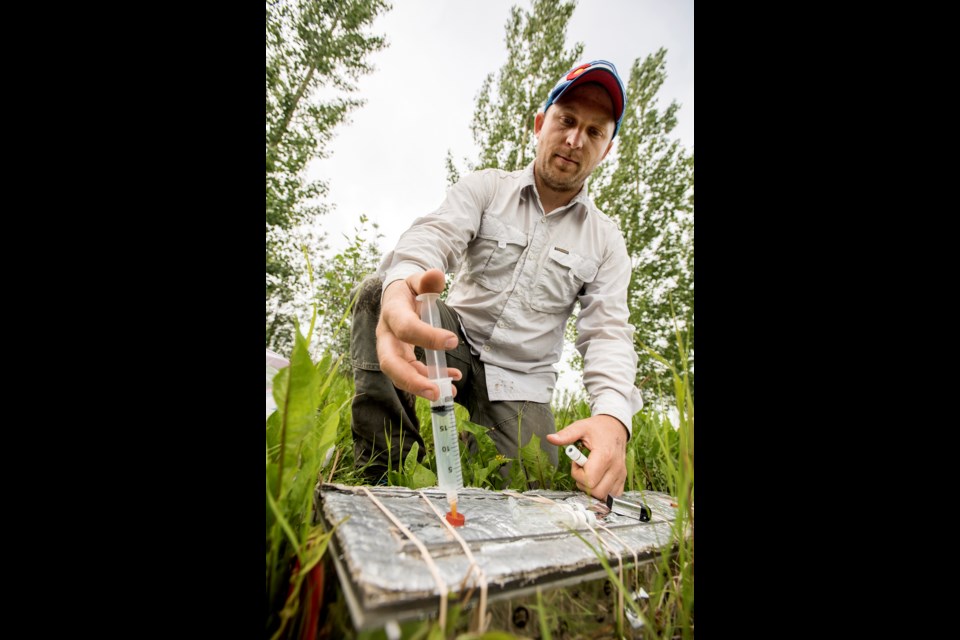Researcher Michael Carson pulls a strange silver box out of his truck and tromps out into a farmer’s field about halfway between Morinville and Legal.
“This is probably the worst site for mosquitoes,” he notes, as about a zillion of them swarm him.
Moments later, he puts the box on the ground, flips a switch, sticks a syringe through a rubber seal in the box, and sucks out some air. He and his teammates will repeat this process about 240 times every other week this summer at experimental sites like this one around Edmonton, all in an attempt to see how farms could help stop the global climate crisis.
Carson, a postdoctoral student with the department of renewable resources at the University of Alberta, is taking part in a five-year study led by Prof. Scott Chang on how trees and biochar could enhance carbon storage in soil on farms. The study is being funded through the federal government's Agricultural Greenhouse Gases Program.
“We are trying to understand how different land management techniques affect soil carbon levels and soil greenhouse gas emissions from agriculture,” said Chang in an email.
Chang said farmland is currently the source of about 10 per cent of Canada’s greenhouse gas emissions. His team hopes to find techniques that would turn farms into emission sinks instead of sources, slowing global heating and improving crop yields.
“Trees are effective at accumulating carbon in their trunks and roots,” Chang said, so planting more trees should store more carbon on farms, which would mean more carbon nutrients for crops and less heat-trapping CO2 in the air.
Other studies suggest biochar (charcoal) can keep carbon out of the air for extended periods and suppress microbes that release greenhouse gases, Chang said.
Testing techniques
Carson said the team has set up 10 experimental plots within a 1.5-hour drive of Edmonton to test the effects of trees and biochar on soil. Each plot has a tree area, which compares grass to new trees to old ones, and a soil area, which compares dirt, biochar, and compost.
Trees and biochar might store more carbon, but they could also cause more carbon/greenhouse gases to be released if they change soil microbes or nutrient levels the wrong way, Carson said. To find out which works best, they need to track all the carbon and greenhouse gases going into and out of the soil at each test site.
“We’re essentially trying to do a carbon budget,” Carson said.
The team uses those silver boxes (which are open on one side and have fans) to capture gas seeping out of the soil so they can suck it up with syringes for analysis with a gas chromatograph. Doing so lets them track the amount of greenhouse gas – specifically carbon dioxide, methane and nitrous oxide – coming out of the soil. The team is also using automated soil sensors and taking soil samples to track changes in carbon content and microbial populations as the experiment progresses.
Carson said the team hopes to find out which of these techniques boost carbon storage the most and what would happen if they were rolled out province-wide.
Results from a previous phase of this study found trees boost a region’s carbon storage by trapping carbon in wood and soil while also lowering net greenhouse gas emissions from soil, Chang said.
Agriculture contributes to and is affected by the climate crisis, Chang said. If farmers can boost on-farm carbon storage, they can help create a more predictable climate that’s less prone to cause crop failure, and potentially earn cash through carbon credits.
“Our results should encourage farmers to consider planting more trees on their less productive land,” he said.
Questions on this study should go to Chang at [email protected].




